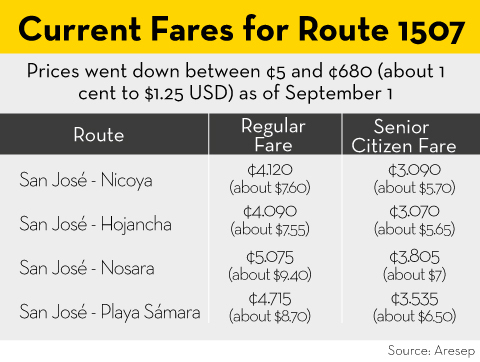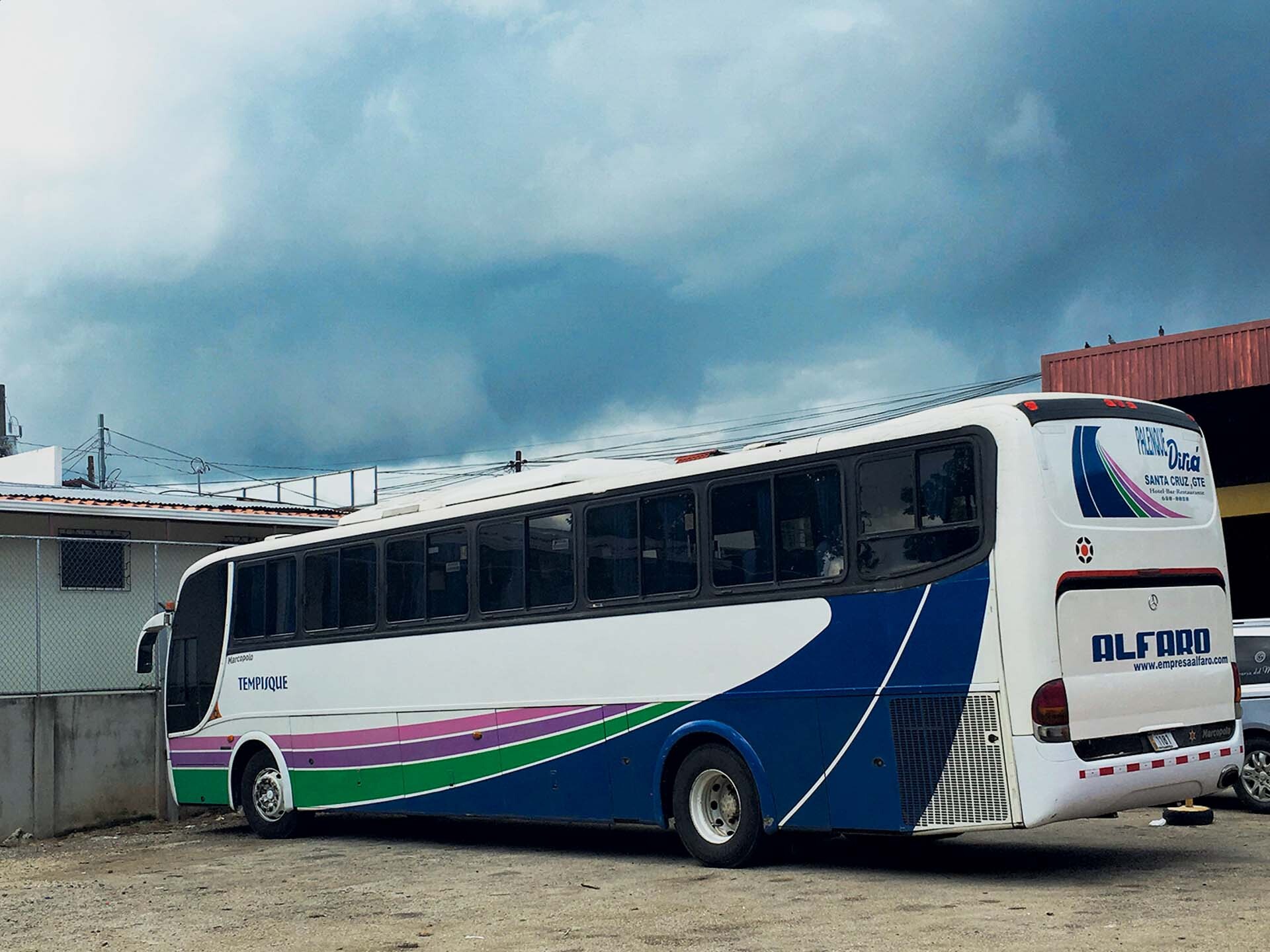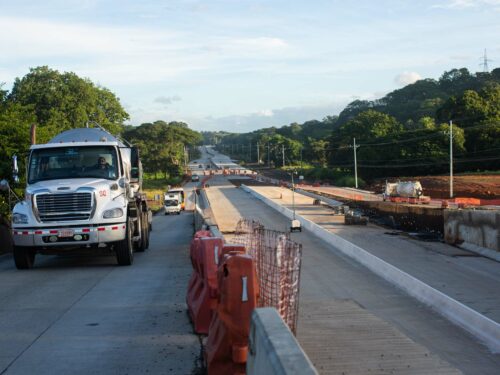
The bus company Transportes Inteligentes de Guanacaste planned to take over route 1507 between Nicoya and San José on August 31, after the Public Transportation Council (Spanish acronym: CTP) agreed that the company Alfaro would no longer be in charge of the route.
However, Alfaro filed a precautionary measure against the CTP with the Administrative Litigation Court (Spanish acronym: TCA) three days away from the change and managed to keep the service for the moment.
What’s going to happen now? Here are five Q and A’s that explain the dispute between TIG and Alfaro.
1- Why did Alfaro lose the concession for the route between San José and Nicoya?
Multiple complaints from passengers about the company’s service, failing to stick to the schedules and the poor condition of the buses were some of the reasons for taking the route away from Alfaro, according to CTP director Freddy Carvajal.
CTP data reveals that as of September 2023, Alfaro had accumulated 15 complaints for poor service, whereas from 2020 to 2022, there were only five.
“There are buses that were working beyond their useful life of 15 years and there were units without policies,” Carvajal commented.
One of the units that Carvajal was referring to is the one that was involved in the tragedy that occurred on September 17, 2022 in Cambronero, when the bus fell over a cliff. The incident left nine people dead.
After the accident, the CTP opened an investigation against the company Alfaro Company because the circulation permit for the bus had expired in 2021.
Finally, on March 29, the council agreed to take the route away from them.
2- How did TIG get permission to operate the route?
The CTP held hearings to establish a new operator and received two proposals to manage route 1507: Autotransportes Colorado de Abangares and TIG, according to the official letter from the institution CTP-DT-DIC-INF-0439-2023.
To define which of the two companies was granted the permit, the institution assessed the availability to immediately take over the service and the similarity between route 1507 and the routes currently operated by both companies.
TIG’s route between Santa Cruz and San José coincides 80% with the route between Nicoya and San José. In addition, the company promised to start operations immediately. The Autotransportes Colorado de Abangares route had 62% of the trajectory in common and requested a period of 120 days to start.
The authorization granted to TIG by the CTP is a temporary permit. This means that the company is in charge of operating while the institution opens a bidding process.
The term of the permit can be extended for up to three years, according to article 25 of the Law Regulating Paid Transportation of People in Motor Vehicles. Having a temporary permit does not prevent TIG from participating in the bidding contest to try to get the concession.
According to TIG representative Óscar Alfaro, the company acquired eight new buses, invested around $1 million USD and hired around 30 people to start operating the route between Nicoya and San José.
The payroll is going to be maintained with the firm conviction that we will start working in a few weeks,” he commented.
Alfaro’s manager, Germán Alfaro, believes that his company can continue to provide the service without the need for TIG to operate temporarily.
“The company is not leaving or dropping the service, nor is it that we don’t have the buses. [Temporary permits] are for when companies have abandoned routes or have problems that definitely make them unable to work,” Alfaro commented.
3- Why is Alfaro continuing to operate the route?
Alfaro continued to operate after losing the concession on March 29, 2023 because there was no company available to take over the route, explained the council’s director, Freddy Carvajal.
It wasn’t until August 24 that the CTP notified Alfaro that they had to stop providing the service on August 30 in order for TIG to assume the Nicoya – San José route the next day.
However, Alfaro filed a precautionary measure against the CTP with the Administrative Litigation Court three days away from the change and managed to keep the service for the moment.
The Administrative Litigation Court temporarily accepted the measure and temporarily suspended the agreement reached by the CTP. The resolution indicates that the transportation council notified the company with an “unreasonable” period of three business days of the date on which it had to leave the route.
According to TIG representative Oscar Alfaro, the precautionary measure signifies an economic burden that the company will have to bear while the judicial body resolves the precautionary measure.
4- What will happen next?
Alfaro will continue to operate the route between Nicoya and San José until the TCA definitively resolves the request for a precautionary measure.
At the moment, the TCA’s precautionary measure is “very provisional”. This means that it is a temporary pronouncement. It’s made without a hearing from the counterpart, in this case the State and CTP’s board of directors.
The final resolution will come when the TCA “has more case evidence to definitively resolve the request for a precautionary measure,” which includes a hearing for the CTP board of directors.
5- If TIG takes over, will the rates increase?
The fares for the route between San José and Nicoya, established by the Public Services Regulatory Authority (Spanish acronym: ARESEP), will be kept in the event that TIG begins to operate the route.

TIG could request a rate adjustment from ARESEP if it goes into operation. In that case, the institution would conduct a study, explained ARESEP’s communication officer, Carolina Mora.
TIG’s representative didn’t rule out making the request once they acquire the route.
Here, it’s not about whims…. The first thing we need to do is get in, manage a series of statistics and data, and make an equation with the investment. And then we can see [if it’s necessary for the company to request a rate adjustment],” said Óscar Alfaro.
That’s what they did after taking over the routes between Santa Cruz and San José on May 28, 2022, previously administered by the company Alfaro. Tickets had cost ¢4,985 (about $9.20) and ¢5,180 (about $9.55) and, when TIG went in, they increased to ¢6,535 (about $12.05).
ARESEP has stated that route 1502 (Santa Cruz – San José) is the result of “the integration, optimization and sectorization of some (not all) of the trajectory that routes No. 1511, 503 and 503-A previously operated.” And they added that, because of that, “the route formed by the unique code of No. 1502 is considered to present new operating conditions in relation to the existing ones.”







Comments